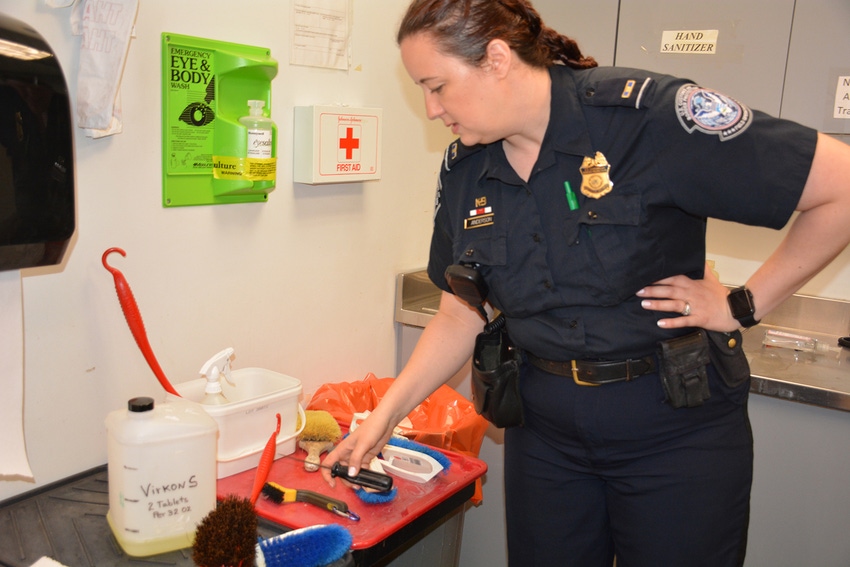Bipartisan bill authorizes hiring 240 agricultural specialists a year until workforce shortage is filled.
July 29, 2019

The Senate Homeland Security & Governmental Affairs Committee unanimously approved bipartisan legislation to address the shortage of agricultural inspectors at the nation’s ports of entry. With ongoing threats of foreign diseases, including African swine fever, the Senate wants the government to have more boots on the ground to offer additional protection.
Agricultural inspectors work to protect the nation’s food supply and agriculture industry by preventing the intentional or unintentional entry of harmful plants, food, animals and goods into the U.S.
The Protecting America’s Food & Agriculture Act of 2019 -- introduced by Senate Agriculture Committee chairman Pat Roberts (R., Kan.), Sens. John Cornyn (R., Texas), Debbie Stabenow (D., Mich.) and Senate Homeland Security & Governmental Affairs Committee ranking member Gary Peters (D., Mich.) -- would ensure the safe and secure trade of agricultural goods across the nation’s borders by authorizing the U.S. Customs & Border Protection (CBP) to hire additional inspectors to fully staff America’s airports, seaports and land ports of entry.
The U.S. Department of Agriculture and CBP work together to facilitate the safe and secure entry of agricultural goods into the U.S. Agricultural specialists and canine units conduct inspections of foreign passengers, commercial vessels, trucks, aircraft and railcars at U.S. ports of entry to protect health and safety by preventing the entry of harmful goods and invasive species that may pose a threat to American food and agriculture. On a typical day, those inspectors process more than 1 million passengers and 78,000 truck, rail and sea containers carrying goods worth approximately $7.2 billion.
According to CBP estimates, there is a shortage of nearly 700 inspectors across the country.
The Protecting America’s Food & Agriculture Act authorizes the hiring of 240 agricultural specialists each year until the workforce shortage is filled and 200 agricultural technicians a year to carry out administrative and support functions. The bill also authorizes the training and assignment of 20 new canine teams a year, which have proved valuable in detecting illicit fruits, vegetables and animal products that may have otherwise been missed in initial inspections. Finally, the bill authorizes supplemental appropriations each year to pay for the activities of the agricultural specialists, technicians and canine teams.
“Agricultural inspectors help secure our country from serious threats that could disrupt our food supply or endanger our agricultural industry,” Peters said. “We need more inspectors and support staff to effectively carry out this vital national security mission and protect Americans’ health and safety. I’m proud to have led this bipartisan effort, and I look forward to the full Senate passing this bill as quickly as possible.”
“I’m pleased this important piece of bipartisan legislation is one step closer to the finish line,” Roberts added. “The Department of Homeland Security is a fundamental partner in supporting American agriculture -- one of our national critical infrastructures. The protection of our agriculture and food supply chain is of utmost importance, and this bill aims to do just that through a strengthened workforce at our borders.”
“Agricultural inspectors are our first line of defense against threats to our agricultural economy,” Stabenow noted. “I’m pleased we are one step closer to hiring more agriculture specialists to address serious shortages and protect the safety of our food supply.”
“Hundreds of billions of dollars in goods pass through Texas’ ports of entry each year,” Cornyn said. “This legislation would help alleviate the shortage of agricultural inspectors tasked with ensuring the safety and integrity of goods and products coming across our border, and I’m grateful to my colleagues on the committee for their support.”
The legislation has received support from a broad coalition of groups, including the U.S. Chamber of Commerce, American Farm Bureau Federation, National Treasury Employees Union, Border Trade Alliance, National Association of State Departments of Agriculture, National Pork Producers, Michigan Farm Bureau, Michigan Agri-Business Assn., Michigan Pork Producers, Airports Council International-North America and City of Pharr-International Bridge.
You May Also Like


.png?width=300&auto=webp&quality=80&disable=upscale)
